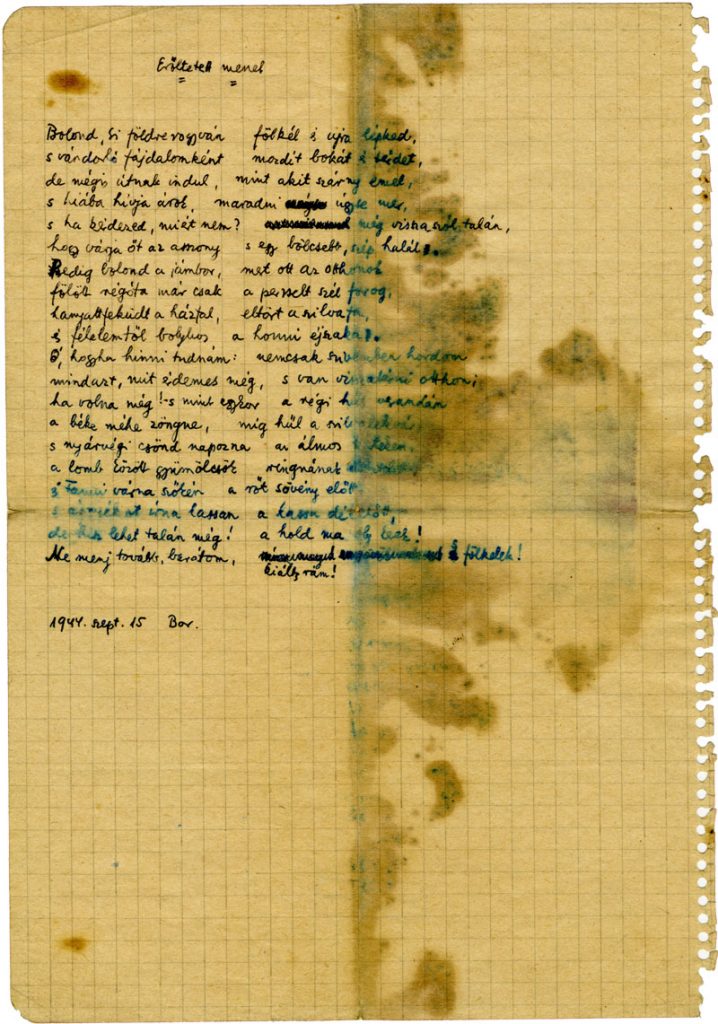Erőltetett Menet (Forced March)
Listen to the poem in Hungarian
Miklós Radnóti – Original Text (September 15, 1944)
Bolond, ki földre rogyván fölkél és újra lépked,
s vándorló fájdalomként mozdít bokát és térdet,
de mégis útnak indul, mint akit szárny emel,
s hiába hívja árok, maradni úgyse mer,
s ha kérdezed, miért nem? még visszaszól talán,
hogy várja őt az asszony s egy bölcsebb, szép halál.
Pedig bolond a jámbor, mert ott az otthonok
fölött régóta már csak a perzselt szél forog,
hanyattfeküdt a házfal, eltört a szilvafa,
és félelemtől bolyhos a honni éjszaka.
Ó, hogyha hinni tudnám: nemcsak szivemben hordom
mindazt, mit érdemes még, s van visszatérni otthon;
ha volna még! s mint egykor a régi hűs verandán
a béke méhe zöngne, míg hűl a szilvalekvár,
s nyárvégi csönd napozna az álmos kerteken,
a lomb között gyümölcsök ringnának meztelen,
és Fanni várna szőkén a rőt sövény előtt,
s árnyékot írna lassan a lassu délelőtt, –
de hisz lehet talán még! a hold ma oly kerek!
Ne menj tovább, barátom, kiálts rám! s fölkelek!
Bor, 1944. szeptember 15.
English Translation
The man who, having collapsed rises, takes steps, is insane;
he’ll move an ankle, a knee, an errant mass of pain,
and take to the road again as if wings were to lift him high;
in vain the ditch will call him: he simply dare not stay;
and should you ask, why not? perhaps he’ll turn and answer:
his wife is waiting back home, and a death, one beautiful, wiser.
But see, the wretch is a fool, for over the homes, that world
long since nothing but singed winds have been known to whirl;
his housewall lies supine; your plum tree, broken clear,
and all the nights back home horripilate with fear.
Oh, if I could believe that I haven’t merely borne
what is worthwhile, in my heart; that there is, to return, a home;
tell me it’s all still there: the cool verandah, bees
of peaceful silence buzzing, while the plum jam cools;
end-of-the-summer quiet, sunbathing, sleepy, bent
over gardens, leaves and fruit, naked and redolent;
that, blonde, my Fanni* is waiting before the redwood fence,
where morning slowly trances its shadowed reticence…
But all that could return – just look at tonight’s full moon!
Don’t go past me, my friend – shout! and I’ll rise again.
Bor, 15 September 1944

Translation Notes
*”Fanni”: Fanni is Radnóti’s wife
Author Notes
A Hungarian man of Jewish descent, Miklós Radnóti was born in 1909 and was a published poet and writer in Hungary before World War II. Persecuted before and during the war because of his Jewish heritage, he was forced into labor on three occasions. The first was in late 1940, the second from July 1942 to April 1943, and the last from May 1944 until his death later that year, when he was executed and buried in a mass grave during a forced march from the camp in Bor, Serbia.
When his body was exhumed from the grave, a notebook was found on his person, containing a number of poems he had written while a forced laborer in Bor. Despite physical damage to the book, these poems were salvaged and recorded. The selected poem, titled “Erőltetett menet (Forced march)” and dated September 15, 1944, displays autobiographical themes and contrasts hope with despair. His longing for home and wife, as well as his wondering if there is even a home to return to, clash with the weariness and pain of his present moment, as well as with the reader’s knowledge that he ultimately never made it home.The physical state of Radnóti’s notebook tells a story of its own, as the pages bear significant damage from the time the book spent on the poet’s corpse, with parts of the handwritten text faded and blotted. Radnóti seemingly knew what would ultimately happen to him, as the first two pages of the book contain a message written in Hungarian, Serbian, German, French, and English instructing whoever found the book to send it to someone he knew at Budapest University.

Historical Notes
This poem, Forced March, and others by the same author, Radnóti, were a regular part of the primary and secondary school curricula in Hungary. The historical context of the poem, Forced March, i.e., the Holocaust, was studied along with the poem.
Sources
Miklós Radnóti Was Born a Century Ago. Exhibition of the Library of the Hungarian Academy of Sciences, 5 May 2009. http://radnoti.mtak.hu/en/04-14.htm. Accessed 19 Dec. 2021.
Poets, Academy of American. You Foolish Men by Sor Juana Inés de La Cruz – Poems | Academy of American Poets. https://poets.org/poem/you-foolish-men. Accessed 19 Dec. 2021.
